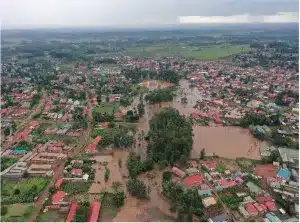How Climate Impacts Mental Health in Africa
As we enter Earth Month and rally to protect our planet, we need to recognize the profound impact climate change effects can have on mental health.
Extreme weather events and natural disasters can cause displacement and resource scarcity, as well as infectious disease outbreaks, as seen in Zambia earlier this year when the country experienced a major Cholera outbreak in the wake of unusually high rainfall and flash flooding.
 Unprecedented weather patterns, such as hailstorms, cause irreparable damage to crops. With harvests lost, families struggle to eat, afford school fees, and pay off loans they took out against their expected profits. These experiences can trigger depression or worsen existing mental health disorders.
Unprecedented weather patterns, such as hailstorms, cause irreparable damage to crops. With harvests lost, families struggle to eat, afford school fees, and pay off loans they took out against their expected profits. These experiences can trigger depression or worsen existing mental health disorders.
In Africa, vulnerability to climate hazards intersects with socioeconomic disparities, amplifying the need for mental health interventions. Susan’s story vividly illustrates the impact of environmental disasters on mental well-being.
Displaced by a catastrophic flood in Uganda in 2022, Susan and her family not only lost their home but also their income, forcing their children out of school. Susan found herself struggling with depression until she found solace in StrongMinds’ therapy group. Through peer support and counseling, she not only overcame depression but also found the resources to rebuild her life amidst adversity.
Susan’s story is not unique and underscores the transformative power of mental health care in the face of environmental challenges. As we commemorate Earth Month, let’s recommit to safeguarding not only the planet but also the mental well-being of its inhabitants. Through initiatives like our IPT-G model, we can empower individuals like Susan to navigate the complexities of climate-induced mental health obstacles and rebuild their lives with resilience and hope.
